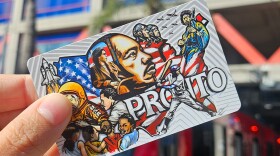Now, we wait.
The window for the public to weigh in on how federal rule-makers should treat Internet traffic is closed, after a record 3.7 million comments arrived at the FCC. The Sunlight Foundation analyzed the first 800,000 and found that fewer than 1 percent were opposed to net neutrality enforcement.
The principle of net neutrality generally means that all Internet traffic is treated equally.
But whether the weight of popular opinion can overcome the significant lobbying heft of Internet service providers fighting against stronger net neutrality rules is a huge question mark. An analysis by San Francisco-based data firm Quid found that Verizon alone spent $100 million to lobby Congress on net neutrality since 2009. (That kind of money could buy you 793 houses or 4 million bottles of Maker's Mark.)
What's On The Table
The proposal before the five-member Federal Communications Commission, led by Chairman Tom Wheeler, would allow broadband providers such as Time Warner and Verizon to engage in "commercially reasonable" traffic management. That means they could potentially charge content companies (like Netflix) to get their content to you faster — paid prioritization, or "fast lanes."
Internet advocates want equal treatment of all Internet traffic, and some, like advocacy group Free Press, have pushed for a reclassification of the Internet as a public utility under Title II, which could give the FCC more enforcement power to keep the Internet open. A broad coalition of telecom and cable companies has opposed this, arguing it would create unnecessary obstacles to broadband deployment. Reclassification would be "unlawful, unnecessary and profoundly unwise," the National Cable and Telecommunications Association wrote in its filing.
What's Happening Now
FCC members are on Capitol Hill this week, answering questions from Congress about plans for regulating the Internet. The Senate Judiciary Committee held a hearing on the topic Wednesday, featuring questioning from strong net neutrality supporters Patrick Leahy, D-Vt., the committee chairman; and Sens. Al Franken, D-Minn., and Richard Blumenthal, D-Ct. Wheeler is testifying Wednesday afternoon to a House panel, and while the topic focus is "the needs of small business and rural Americans," net neutrality is likely to come up.
The Wait
Wheeler has said that he hopes the FCC will approve a proposal before the end of 2014, which gives the commission a few more months to sift through the comments, meet with stakeholders and reconvene on this issue. In the meantime, there's plenty of reading the tea leaves of Wheeler's public comments and moves. One issue that's come up in this interim period is how to treat mobile connections.
The Mobile Issue
When policymakers last addressed this issue in 2010, they decided to treat your mobile connection to the Internet differently from the one that goes to your home or office, giving mobile carriers an exemption from net neutrality enforcement. But as our mobile phones have become the ever-present computing devices in our lives — ones we are more and more addicted to — it's beginning to not make sense that mobile and home connections are regulated as two different Internets.
Wheeler has indicated he's reconsidering this. He said in a speech last week that the lines are blurring; people want connectivity everywhere they go. That suggests the principle of net neutrality could be extended to mobile broadband, too.
All his statements, however, are but merely his opinions at any given time. Making the lasting rules on this issue will require some hustling if commissioners are committed to doing it by the end of the year. One thing's certain: Millions are watching.
Copyright 2014 NPR. To see more, visit http://www.npr.org/.






